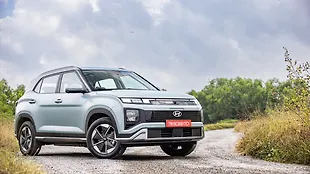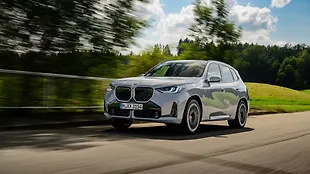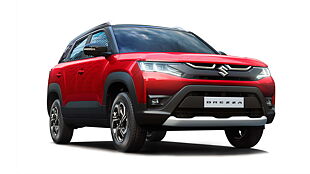Introduction

The new Maruti Suzuki Dzire has a lot going for it. For one, it follows in its predecessor’s footsteps in the compact sedan arena by outselling everything in the segment by a huge margin. But that’s not all. It even beats the current market trend which rhymes with SUVs. In this comparison however, we decided to see if the Dzire (diesel-auto) has what it takes to take the fight to the Volkswagen Ameo (diesel) with the highly acclaimed DSG transmission. We’ve subjected them to an exhaustive test, so let’s find out who wins.
Looks the part?

Until now, the outcome of the limitations in designing a well-balanced sub-four metre sedan is obvious when you glance at the compact sedans on the road today. With the arrival of Maruti’s new Dzire, however, these limitations have literally been thrown out of the window. The new Dzire has proved that a compact sedan does not need to look like a compromise, be it in terms of external design, or cabin spaciousness.
The new Dzire looks large, proportionate, and the entire design is a lot more sloping than earlier. Despite being significantly larger than the outgoing model, the new Dzire is still 80kg lighter than the older model. It has a wide grille, a strong shoulder-line and a balanced boot section.

On the other hand, the VW Ameo influences you with its near identical Polo nose, but also manages to look disproportionate in profile. That’s simply because a large section of the boot was hacked to get the Ameo under four metres. However, VW tapered the roof in a bid to balance the looks.
Cabin talk

Slide onto the front seats and you’ll instantly notice the new Dzire’s freshly designed dashboard that’s finished in dual-tone (black-beige). Wooden accents have been used to add a premium feel to the dash and door pads. Plus, the centre console with the large infotainment screen, is nicely tilted towards the driver to aid ease of access to all the functions. While there’s enough space in the lower centre console to hold your accessories, there’s even more room in the door pads which can also hold a 1-litre bottle. Although visibility through the rear windscreen is good, the window line is higher than the Ameo’s.

Once seated in the Volkswagen Ameo, we appreciated the more premium ambience. This is due to the superior fit and finish which can be seen in the buttons, stalks, chrome inserts, and the perfectly sized steering. We just wish that the dual-tone dashboard and door plastic could have been better finished to mirror the quality levels of the rest of the cabin. There’s lots of cubby space in the centre console and the door pad which can also hold a 1-litre bottle. On a lighter note, finding the perfect driving position in the Ameo is easy thanks to the superior front visibility (lower window line) and the steering which can also be adjusted for reach too (Dzire gets only rake adjustment). However, the visibility through the rear windscreen is restricted due to the high boot lid.

In terms of space in the front, the Dzire has much more legroom and headroom when compared to the Ameo. Armed with large front seats, the Dzire is better for bigger occupants and there’s more thigh support too. On the other hand, the cushioning on the Ameo’s front seats are firmer, which essentially translates into more comfort over long journeys. Plus, there’s markedly more shoulder-room in the Ameo too. At the rear, the Dzire gets a more comfortable bench which boasts extra legroom, shoulder room, a shorter transmission tunnel (eases middle occupant seating) and better thigh support than the Ameo. It feels airy, has an arm rest (with cupholders), the backrest angle is appropriate, and both rear doors can hold a 1-litre bottle along with separate space for accessories.

Although the Ameo has more headroom at the rear, it falls short on just about everything else. It feels claustrophobic, there’s very little thigh support, the seat-back position is upright and the tall tunnel makes seating conditions for the middle passenger difficult. Not to forget that the door pad stowage is slim (no bottle holders) and there’s neither an arm rest nor a seatback pocket. But there is one cup holder that opens from underneath the rear ac vents. On the boot front, not only can the Dzire’s boot swallow an additional 48-litres of luggage over the Ameo’s, it is wider and more useable too.
Feature loaded?

On the features front, although both cars are well-equipped, they also have their own set of unique features. The Dzire gets an infotainment system that is both Apple CarPlay and Android Auto compatible, and also has a smart key with keyless entry which isn’t available in the Ameo. However, the latter comes with many more features such as ESP, hill hold, cruise control, one touch up and down function for all four power windows (Dzire gets only driver side auto), rain sensing wipers, and tilt/telescopic steering adjust (Dzire gets only tilt).

Ease of driving

Maruti’s Dzire uses the same 1.3 litre 74bhp diesel engine as the earlier car. Although, there is no bump-up in figures, the new car is quite light which improves the performance substantially. This can be seen in the 0-100kmph run which took 13.14 secs. Off the mark, the Dzire delivers its power progressively, and acceleration is smooth. It is post 1800rpm that there’s a surge which leads to a strong mid-range which lasts till about 4000rpm. However, it’s a narrow power band. Plus, there’s no point dragging the revs beyond 4000rpm either, since you will only notice an increase in engine noise than any progress in speed. Our VBox also revealed that the 20-80kmph and 40-100kmph driveability tests took 8.19 secs and 10.49 secs respectively.

The highlight here is the AMT gearbox, which is undoubtedly one of the better ones that Maruti has churned out. The familiar pause has been kept to a minimum, and the only time you really notice it is when you floor the throttle for the maximum performance. This is when the AMT system struggles to both upshift and garner speed at the same time. But, the trick here is to drive in ‘less-than-maximum’ throttle position which then allows the AMT system to shift smoothly. Also, slotting into manual mode solves this pause even further, and all you need to do is back off the accelerator pedal each time you manually shift. In the city, the Dzire returned 14.2kmpl while it managed 19kmpl on the highway run.

Volkswagen’s Ameo uses a 1.5-litre 108bhp/250Nm diesel unit that comes with the acclaimed seven-speed DSG. Once on the move, even though there is some lag up to the 2000rpm, it never feels low on power at slow speeds. Post that, however, the unit comes into its own, and there’s a strong surge that can be felt. This motor also makes itself quite audible within the cabin. Now, since there’s a wide mid-range that tails off at about 5000rpm (in manual mode), it also gives you more room for some spirited driving. The overall engine response is decidedly better than the Dzire, and this is obvious from the 0-100kmph sprint that takes just 11 secs. It is also much quicker than the Maruti in the driveability tests (20-80kmph/40-100kmph), by 2.1 secs and 2.29 secs respectively.

What seals the deal here, is the seven-speed DSG auto transmission that’s hooked on to this sprightly motor. Gear shifts are precise and quick. This gearbox has two modes called ‘D’ and ‘S’. When slotted in ‘D’, part throttle inputs get the system to use the current gear to increase momentum. Depress the pedal further and that’s when the downshift occurs. Moreover, the ‘S’ mode spices up the engine’s response even further by holding gears all the way to the rev-limiter. The superior performance is also the reason behind the slightly lower fuel efficiency figures of 13.7kpl in the city and 18.6kpl on the highway.
Road manners

Let’s talk about the ride and handling characteristics now. At lower speeds, the Dzire’s suspension feels firm. There is some body movement while going over potholes or broken surfaces, but it doesn’t get the occupants to feel uncomfortable. As speeds rise, the ride quality from the Dzire’s well-judged and refined suspension set-up is surprisingly flat. This compact sedan just glides over bad surfaces and it keeps you well-isolated from external noises. Although there is some roll while going around corners, it is well contained and there’s a lot of grip too. The only dent in the entire ride and handling package is the feedback from the steering. It feels vague around the dead centre and can be a deterrent if you’re in the mood to drive fast around bends.

On the other hand, the Ameo’s suspension set-up is on the stiffer side. At slow speeds, the firmness can be felt more than the Dzire’s within the cabin but it doesn’t really get to the point of being uncomfortable. However, the suspension noise while going over big potholes sounds harsher than in the Dzire. Nevertheless, as speeds pick up, the dampers can absorb most bumps without much being felt in the cabin. Also, due to the stiffer set-up, the high speed manners are more stable in comparison. But there is more roll in the Ameo since it weighs 200kg more (1190kg) than the Dzire that tips the scales at just 990kg! That said, what makes the Volkswagen Ameo more interesting to drive is the feedback from the precise steering that allows you to go exactly where you want.

The idea behind comparing these diesel automatic compact sedans was also to gauge which one turned out to be the convenient city runabout. The VW Ameo’s heavier steering, pedals and controls made it the more tedious car to drive in congested city conditions. However, it was the Maruti Dzire’s light steering, controls and pedals which undisputedly made it a delight to drive within the city.
Verdict
2nd
Volkswagen Ameo TDi A/T
Final score: 379/600
Price: Rs 11.79 lakhs, On-road Mumbai


What marks the Dzire down is the typical light Japanese car feel, and it falls short of some essential features too. However, where it really falls behind the Ameo is in the engine and gearbox department. But these are just small chinks in its otherwise strong armour. What works for the new Dzire is the surprisingly proportionate compact sedan design, the better efficiency, spacious interiors, more consistent fit and finish, good packaging, and the superior ride and handling. Of course we also need to highlight that Maruti’s new Dzire is Rs 88,000 cheaper than the Ameo. Despite the lesser price tag, the new Dzire essentially offers a practical overall package with no prominent flaws which are deal breakers. Do we really have to say anything more here?
Pictures: Kapil Angane
Maruti Suzuki Dzire diesel M/T vs Hyundai Xcent diesel M/T vs VW Ameo diesel M/T
Specification
| CAR NAME | Maruti Suzuki Dzire | VW Ameo |
| Variant | ZDI Plus AMT | Highline 1.5L AT |
| ENGINE | ||
| Fuel | Diesel | Diesel |
| Installation | Front, transverse | Front, transverse |
| Displacement | 4 cyls, 1248cc | 4 cyls, 1498cc |
| Power | 74bhp at 4000rpm | 109bhp at 4000rpm |
| Torque | 190Nm at 2000rpm | 250Nm at 1500rpm |
| Power to weight | 74.74bhp per tonne | 91.59bhp per tonne |
| Torque to weight | 191.92Nm per tonne | 210.08Nm per tonne |
| Gearbox | 5-speed AMT | 7-speed DSG |
| CHASSIS & BODY | ||
| Kerb weight (measured) | 990kg | 1190kg |
| Tyres | 185/65 R15 | 185/60 R15 |
| Spare | Full-size | Full-size |
| STEERING | ||
| Type | Rack and pinion | Rack and pinion |
| Type of assist | Electric | Electric |
| Turning circle |
9.6m |
10m |
| BRAKES | ||
| Front | Discs | Discs |
| Rear | Drum | Drum |
| Anti-lock | Yes | Yes |
Test Data
| CAR NAME | Maruti Suzuki Dzire | VW Ameo |
| Variant | ZDi Plus AMT | Highline diesel A/T |
| PERFORMANCE & BRAKING | ||
| 0-20kmph | 1.53s | 1.10s |
| 0-40kmph | 3.52s | 2.60s |
| 0-60kmph | 5.56s | 4.62s |
| 0-80kmph | 9.12s | 7.16s |
| 0-100kmph | 13.14s | 11.00s |
| 0-120kmph | 19.77s | 15.72s |
| 20-80kmph in 3rd gear | 8.19s | 6.09s |
| 40-100kmph in 4th gear | 10.49s | 8.20s |
| 80-0kmph | 26m | 25.48m |
| FUEL ECONOMY | ||
| City | 14.2kmpl | 13.7kmpl |
| Highway | 19.0kmpl | 18.6kmpl |
| Tank size | 37 litres | 45 litres |
| Range | 526km | 622km |
| INTERIOR MEASUREMENTS | ||
| Front | ||
| Legroom(Max/min) | 890/660mm | 860/640mm |
| Headroom | 980mm | 940mm |
| Shoulder room | 1260mm | 1290mm |
| Backrest height | 620mm | 590mm |
| Rear | ||
| Legroom(Max/min) | 900/650mm | 810/570mm |
| Ideal legroom | 720mm | 620mm |
| Headroom | 900mm | 930mm |
| Shoulder room | 1300mm | 1250mm |
| Seat base length | 470mm | 460mm |
| Backrest height | 630mm | 560mm |
| Boot | 461 litres | 426 litres |
| Length/width/height | 740/1040/600mm | 780/960/570mm |
| Loading lip height | 710mm | 670mm |
Score Sheet
| Parameters | Max points |
Maruti Suzuki Dzire |
VW Ameo |
| DRIVING FEEL | |||
| Steering response | 20 | 14 | 13 |
| Directional stability | 25 | 15 | 18 |
| Engine characteristics | 25 | 16 | 16 |
| Gearbox | 20 | 12 | 16 |
| Visibility | 10 | 7 | 6 |
| Intermediate results | 100 | 64 | 69 |
| SPACE | |||
| Front Space | 25 | 14 | 12 |
| Rear space | 25 | 12 | 9 |
| Feeling of space | 20 | 14 | 10 |
| Boot space/flexibility | 20 | 15 | 14 |
| Payload | 10 | 5 | 5 |
| Intermediate results | 100 | 60 | 50 |
| IN THE CABIN | |||
| Comfort equipment | 25 | 12 | 13 |
| Operatibility | 15 | 11 | 10 |
| Feel of quality | 20 | 13 | 12 |
| Front seats/ingress | 20 | 14 | 14 |
| Rear seat/ingress | 20 | 14 | 12 |
| Intermediate results | 100 | 64 | 61 |
| PERFORMANCE | |||
| Acceleration | 25 | 16 | 18 |
| Top speed | 10 | 7 | 8 |
| Driveability | 30 | 23 | 29 |
| Braking | 25 | 20 | 18 |
| Environment | 10 | 7 | 7 |
| Intermediate results | 100 | 73 | 80 |
| ROAD MANNERS | |||
| Ride quality | 30 | 23 | 21 |
| Turning circle | 15 | 14 | 13 |
| Handling | 20 | 14 | 14 |
| Manoeuvrability | 15 | 12 | 11 |
| Safety | 20 | 3 | 4 |
| Intermediate results | 100 | 66 | 63 |
| PRICE | |||
| Price | 45 | 20 | 20 |
| Resale | 10 | 8 | 6 |
| Warranty | 10 | 7 | 7 |
| Fuel efficiency | 35 | 23 | 23 |
| Intermediate results | 100 | 58 | 56 |
| Total | 600 | 385 | 379 |

![Maruti Suzuki Dzire [2017-2020] Image Maruti Suzuki Dzire [2017-2020] Image](https://imgd.aeplcdn.com/272x153/cw/ec/26860/Maruti-Suzuki-Dzire-Exterior-118637.jpg?wm=0&q=80)























